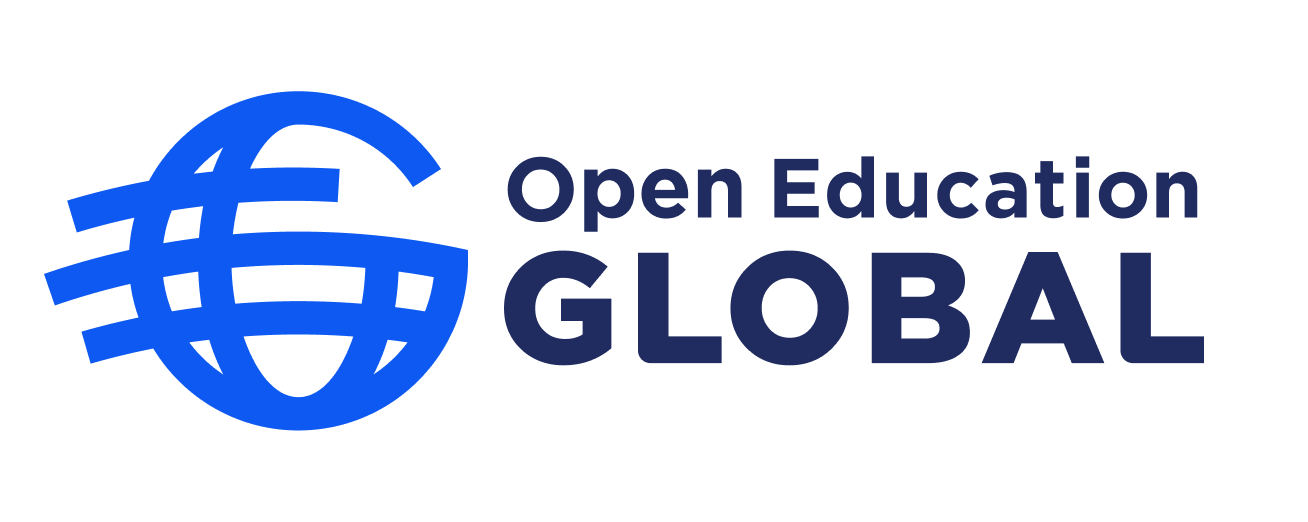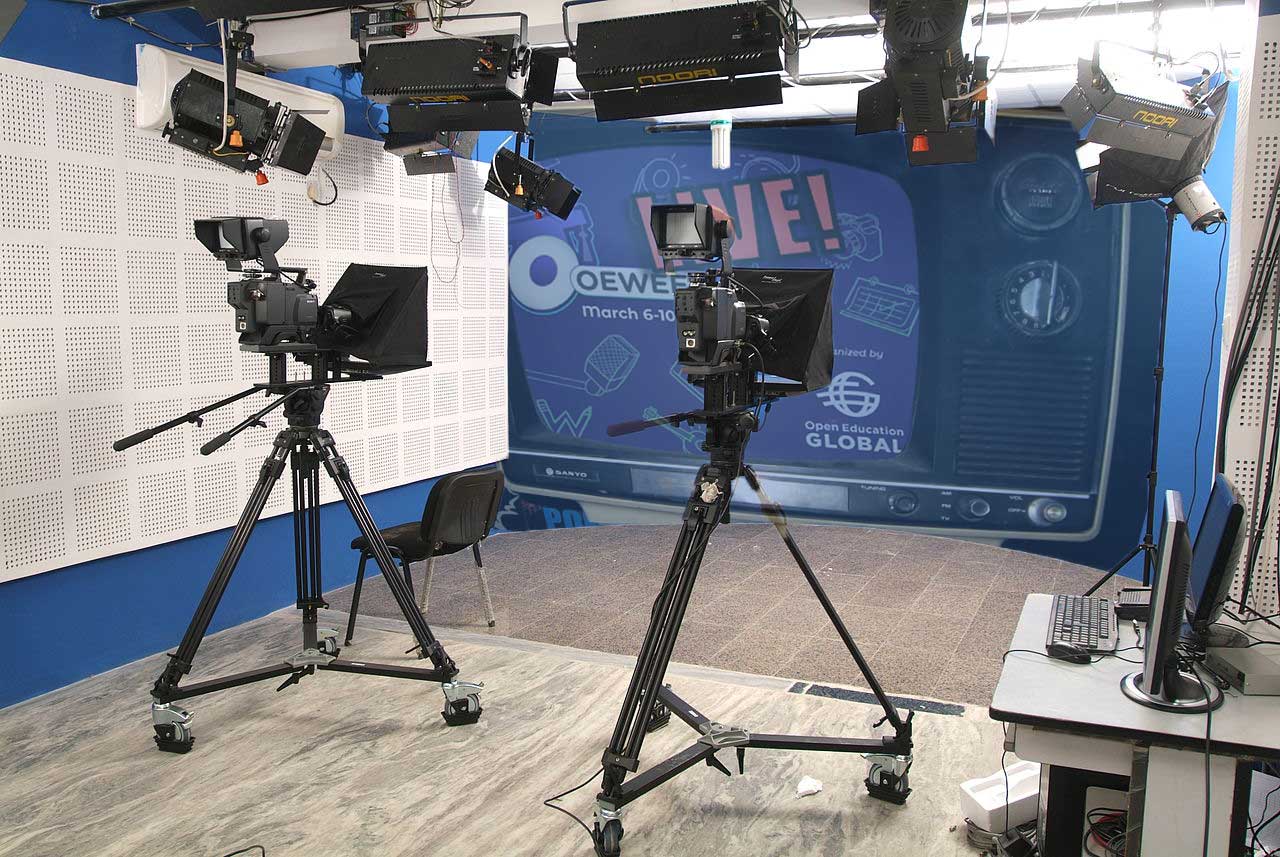Another successful Open Education Week has zoomed by including hundreds of global events and resources shared. As usual, there is too much happening to take it all in during one week. In our planning suggestions, I proposed a new concept to offer something like a live show, on the internet, that could be some kind of cross between a news report and a talk show.
I’ve always felt a live show adds an element of excitement and I think we achieved it. Plus, given the webinar/presentation formats of many of the OEWeek events, I saw an opportunity for open conversations for guests willing to go live on the internet (ultimately 44 of them joined in).
I am not sure my colleagues fully latched onto my idea, but they allowed me to go ahead with what I called the OEWeek Live show that in the end produced 12 episodes that were streamed to YouTube. They are all available now as a playlist, that’s 11 hours, 33 minutes, 28 seconds of shows, where we offered two shows entirely in Spanish and one in Portuguese.
For a quick show guide:
- Monday March 6
- Our Monday First Show included Jennryn Wetzler (Creative Commons), Catherine Cronin (Higher Education for Good, #HE4Good), Maren Deepwell (ALT-C, OER23), and Jennifer Rogers (LibreTexts) all sharing about their projects, plus open discussion on finding joy in learning and differing interests in the open education community [Watch this show]
- An hour later we offered a special show as A Global Welcome from Andréia Inamorato an opportunity to hear from OEGlobal’s executive director offering her perspective as leading this event [Watch this show].
- And again one more hour later Andreia returned to host OEweek Live! Segunda-feira em Portugues a most special conversation with colleagues as it was conducted in Portuguese. Guests included Dra. Sara Dias Trindade (Universidade do Porto, Portugal), Dra. Rita Maria Tarcia (ABED, São Paulo, Brasil), Msc. George Bento (ABED, Recife, Brasil), Dr. Luciano Sathler (ABED, Belo Horizonte, Minas Gerais) and Msc. Carlos Alberto Pereira de Oliveira (Universidade do Estado do Rio de Janeiro, Brasil) [Watch this show]
- The day was not done as the Monday Final Show offered a conversation with Martin Weller (Open University UK), Florence Devouard (Wiki in Africa) where we heard about GO-GN, Edtech metaphors, podcasts, and many of the Wikimedia and Wiki in Africa climate change activities happening the month of March. That was just one day! [Watch this Show].
- Tuesday March 7
- For the opening Tuesday First Show we connected from Canada, Europe, and India with Heather Ross (University of Saskatoon), Terry Greene (Trent University), Bea de los Arcos (TUDelft), Sushumna Rao (KBR & HL Human Development Foundation). We heard about everything from OER repositories and campus OE climates to the Liberated Learners project to teaching Engineering students about OER to the We Like Sharing photo contest to designing of H5P rubrics plus even some perspectives on artificial intelligence [Watch this show].
- And in Tuesday Second Show we welcomed Nate Angell (Creative Commons), Vidminas Vizgirda (University of Edinburgh), Lauri Aesoph (BCcampus). In rounds we heard about plans for the CC open summit, a GO-GN fellow’s research interests, and the latest on open content from BCcampus. Then we dug a bit into the Open Learning Experience Bingo idea and again, ventured a bit into AI [Watch the show].
- Wednesday March 8
- We opened Wednesday with a session in Spanish, OEWeek Live! en Español Miércoles 8 de Marzo with Marcela Morales (OEGlobal), Agustin Huertas (OEGlobal intern), Kristelle Gutierrez (OEGlobal intern), María Soledad (Marisol) Ramirez-Montoya (OEGlobal Board Member), and Diana Hernadez-Montoya (OEGlobal Board Member). Our interns shared plans for new Spanish learning materials and an open survey for the OELATAM node and our board members relayed other relevant projects of interest to our Spanish speaking open education community [Watch this show].
- And we got into the technology for the Wednesday Second Show with Paul Hibbitts (Hibbitts Design) and Zack Krida (Automattic) where we got to see live demos of the publishing platform of Docsify This and the Openverse media search site, the modern and snazzy descendent of the CC Search [Watch this show]
- Thursday March 9
- We went full on experimental in the Thursday First Show with Lorna Campbell, Sheila MacNeil, and Paola Corti representing the OER23 Conference Planning Team whom we brought in to the studio via their Discord meeting space to learn about the upcoming conference in Inverness, Scotland. Then we brought in Rob Farrow (UK Open University) for an in depth conversation about the GO-GN project and his efforts with ENCORE+ research on innovation in OER [Watch this show].
- Then we offered a second show in Spanish– Conversación informal: Competencias Digitales Docentes del Profesorado Universitário de España en Educación Abierta with Andreia Inamorato (OEGlobal), Dra. Cristina Villalonga (Universidad de Nebrija), Dr. Juan Ramón Lacalle Remigio (Universidad de Sevilla), Dr. Edmundo Tovar (Universidad Politecnica de Madrid – UPM), and Dr Carlos Delgado Kloos (Universidad Carlos III de Madrid) all sharing about open education projects and activities happening in Spain [Watch this show].
- The last Thursday show had grand plans to be in English and French, but that’s how live TV sometimes goes in a different direction. Still we had a fast moving conversation with Todd Conaway (University of Washington Bothell), Chris Lott (University of Washington Tacoma), Kim Carter, Jane Gravill, and Fatih Yegul (Conestoga College), and Alex Enkerli (Collecto). The topics ranged from informal learning communities to a new Open Access Teaching Case Journal to Francophone OER, and even a round of what the panel was hopeful for [Watch This Show]
- Friday March 10
- Our final show of the week brought to the studio Maha Bali, Mia Zamora, and Clarissa Sorensen-Unruh (Equity Unbound), Bukola James (Wikipedia in the Classroom Nigeria), and Karen Cangialosi (OEGlobal) where we covered teaching with Wikipedia, the MyFEST program, and OEGlobal’s weeklong effort to open up individual memberships. But again we went beyond projects and had rich conversations about challenges and hope [Watch this show]
This format was extremely refreshing for us and we were rewarded to witness so much cross connections happening in an unstructured format. For anyone interested this live show format was done relatively easily with Streamyard which broadcasts from the web directly to YouTube. Participants watching there were able to send comments and questions directly to our studio.
We are interested in continuing with some kind of ongoing live show here at OEGlobal- and please visit us in OEG Connect to tell us your ideas on what might make it valuable to you and this community.
As we hopefully showed this week, going live creates a palpable energy and a conversational format opens much opportunity to emerge. Would you want to go live with us? Reply below.
Featured Image: Television studio HTV.jpg Wikimedia Commons image by Krish Dulal licensed Creative Commons Attribution-Share Alike 3.0 modified by Alan Levine to include the OEWeek Live logo.


So… that was a lot of fun for Open Education Week.
What if we (the royal we) did an OEGlobal live show on an ongoing basis? Who might be interested in joining us for a future segment? We could highlight work, talk about hot topics, share more demos, do some live training, watch my dog roll around in the snow (okay that last one was just a reading check).
Help us brainstorm making a regular internet show a thing we share here. Thoughts?
On the topic of “hanging out”, there’s something to be said about the little nudge, in online spaces among colleagues: “got a minute?”
Elaborate technology exists to make those moments happen. More importantly, though, there’s a democratic “we” in what might be emerging as a Community of Practice.
So, typically, things start slow. You gather a few people in a space (online or off). You do it with some regularity. At one point, it might become part of someone’s work or “extracurricular”. Overall, though, it’s taking its time to build into something of a momentum. Importantly, in our case, special care should be taken to make sure that those who feel included aren’t merely those who regularly feel included. And there should be connections across networks.
Eventually, it could become something else. Nobody knows what until the conditions are met so it could happen. It’ll probably merge with conferences and forums and festivals and meetings. It might be mentioned on occasion “hey, I heard this from someone at the last chat”. It doesn’t carry its own Key Performance Indicators or Quality Assurance criteria. It’s a thing which happens and helps the movement thrive/grow.
You sure get my idea, Alex. I have hopes we can create spaces like that here in OEG Connect and more open conversation sessions.
I am going to continue the “live”show concept very soon, and hopefully this achieves more regularity. We are also looking at perhaps a less public streamed approach, more like open conversation hours or coffee time as my colleague Ken Bauer does as #educoffee.
Stay tuned!
“stay tuned” by Alivvie is marked with CC0 1.0.